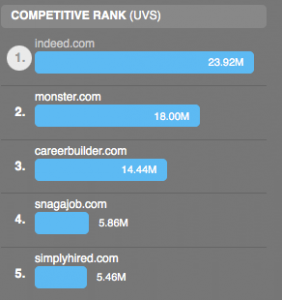Joel Cheesman always has the scoop in the Internet Recruiting industry.
As a subscriber to his blog, I got a late-night email with a tip stating that LinkedIn might be buying Indeed.
That got me thinking… ‚ÄúWhat a brilliant move by LinkedIn!‚Äù
Unfortunately, ‚ÄúThe deal that could have been‚Äù wasn’t.
Instead, Indeed is being acquired by Recruit Co, from Japan. Congratulations to Rony and Paul, the founders of Indeed.com. You guys have done a great job. I’m really happy that you finally got your big payout!
But.. How marvelous would it have been if LinkedIn did actually buy Indeed?
Here are my thoughts… anyone at LinkedIn listening?
In just one acquisition, LinkedIn could have become the world’s largest job board, significantly increased it’s revenue upside, added a significant offerings to employers, put the ‚ÄúLights Out on BranchOut‚Äù, the final nail in the SimplyHired coffin, and the once-and-for-all end of the Monster reign.
How could it have happened?
Here’s my thoughts…
Indeed.com continues to grow as the world’s the largest job board, based on unique website visitors. Indeed has a huge revenue upside, as it just recently released its resume database offering. LinkedIn has pretty much one primary offering for employers… searching it’s profiles. Meanwhile, Indeed has a very successful pay-per-click job posting model that might have been leveraged into a much larger job posting revenue model for LinkedIn. Additionally, Indeed has a large affiliate network of partner sites that drive job seekers to it’s jobs, something that LinkedIn doesn’t have at all.
Indeed’s unique visitor traffic for the month of August 2012 shows nearly 24 million unique visitors, with a 50% year to date user growth rate (as reported by compete.com).

Meanwhile Monster (MWW) shows 18 million uniques monthly visitors with a 24% growth, CareerBuilder 14.4 million uniques with a 10% year-to-year decrease in unique visitors, and SimplyHired flat with 5.5 million uniques and only 2% user growth.
So how does BranchOut fit into the picture?
BranchOut, the ‚ÄúLinkedIn of Facebook‚Äù, has raised over $49 Million in Venture Capital funding, yet their unique user website visitors has declined nearly 80% in 2 months from it’s high of 1.1 million uniques in April. To put those numbers in perspective, BranchOut’s unique visitors show approximately 220,000 unique visitors for 9 of the last 12 months, per Compete.com. On average, that’s less than 1% of Indeed’s current unique visitors. So, while BranchOut is great at getting checks from Venture Capitalists, and news spots from San Francisco based news organizations, they aren’t good at converting and monetizing job seekers.
BranchOut’s primary revenue stream seems to be affiliate job postings from none other than, you guessed it… Indeed!
If LinkedIn had bought Indeed, they might continue the BranchOut / Indeed partnership for a while, or until they decide to put the “Lights Out on BranchOut”. BranchOut’s valuation would go in the crapper because their user visits aren’t sustainable, no matter how much money they throw at the problem, and their only real revenue stream just disappeared.
BranchOut has little, if any, traction with recruiters and employers, so coming up with another revenue stream to monetize a 25 million connected but disinterested users isn’t likely in the short-term.
Additionally, a LinkedIn purchase of Indeed would have given the struggling BranchOut two masters… LinkedIn for it’s revenue and Facebook for its platform.
If that wasn’t bad enough, Facebook is rumored to be launching a job board of it’s own, which by itself, creates an additional huge risk for BranchOut.
Well, how does SimplyHired fit into the picture?
Early on, LinkedIn partnered with SimplyHired to provide ‚Äúback-fill‚Äù job postings on the LinkedIn Job search functionality. It works like this… When a LinkedIn user does a search for jobs, the first results listed are from LinkedIn’s direct clients. Additional listing are ‚Äúback-filled‚Äù from SimplyHired’s database of job postings. While SimplyHired is tight-lipped about its partner traffic generation, my connections tell me that the LinkedIn traffic is ‚Äúsignificant‚Äù.
Earlier this year SimplyHired went through a major layoff, causing concern about it’s long-term viability. Imagine if LinkedIn killed their partnership with SimplyHired, listing the Indeed job postings instead. A major job seeker traffic loss on top of the layoff might have been the final nail in the SimplyHired coffin.
And what about the Monster?
Well, Monster is for sale. Everyone knows it, and no one wants to buy it.
It’s future revenues prospects aren’t great. It doesn’t look like anyone wants to buy a washed up ‚ÄúMonster with no soul‚Äù, a ‚Äútechnology company‚Äù with no technology, or a ‚ÄúWorldwide‚Äù job board where European revenues are going downhill faster than Lindsey Vonn. (Those numbers haven’t even started to hit the earnings reports because of how Monster books sales)
Monster has made no strides to increase it’s value proposition to employers or job seekers, even in the face of competition like LinkedIn. As I mentioned in March 2010, LinkedIn IS the new Monster. I just think this would have completely deflated all the efforts Sal and team are doing to put lipstick on a pig. Don’t get me wrong. Monster is a great website and tool for both employers and job seekers, but let’s be honest… the innovation and soul left when it’s founder Jeff Taylor left in 2005.
I really wish LinkedIn did do the deal. That would have been fun to watch! Instead, we’ll have to wait to see what other marginally exciting news might come out of the HR industry this year.

